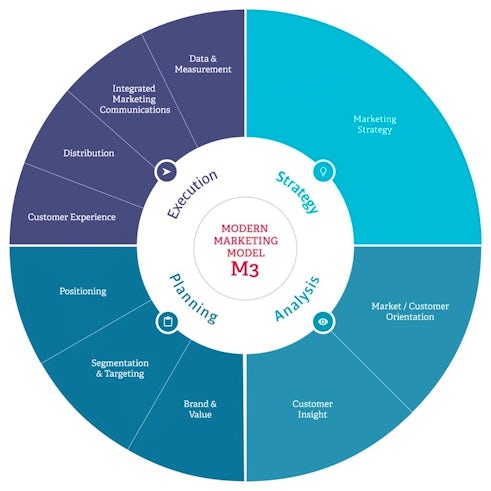Marketing is having a wandering-in-the-wilderness moment.
Or rather, another such moment in its turbulent history of disruption. Digitization, personalization, customer experience, data and analytics, and a growing kaleidoscope of multichannel interactions have changed the meaning of what it means to be a marketer.
One study from the bygone era of 2010 estimated digital marketing spend would jump a staggering 48% by 2015. While bullish (more sober estimates had traditional advertising spend declining slightly between February 2014 and February 2018, while digital marketing spend increased 7 percentage points in that time), there’s little doubt that “marketing” in 2018 means something very different than it did during the days of Madison Avenue’s Mad Men.
Evolution in marketing’s scope has brought confusion to the highest organizational levels; the shift toward digitized marketing, and away from traditional modes, has led many C-Suite executives to look askance at CMOs, whose remits have become increasingly unclear.
Reflecting this uncertainty is the rate of turnover faced by Chief Marketing Officers: they remain the least secure of their boardroom colleagues, with the lowest average tenure of just 4.1 years on the job, compared to 8 years for CEOs (from the Harvard Business Review’s The Trouble with CMOs report, 2017).
A recent series of interviews with marketing executives conducted by Econsultancy pointed to a clear desire for change in marketing’s role within the modern organization.
Still, signals of a bright future for marketing remain.
Revenues from mobile and non-mobile digital advertising alike soared in 2017, as last year marked the first in which digital marketing spend outdid television (both broadcast and cable). Similar stats are to be found in our regularly-updated statistics database.
The explosion of digital has brought with it an extraordinary demand for marketers who understand which channels suit which sectors, proper spending divisions between digital and traditional, along with the suite of skills every modern marketer needs in his or her toolkit.
Depending on one’s taste for change, the resulting tumult has left ordinary marketers with exciting opportunities to learn new aspects of their craft. Yet traditional models haven’t evolved to incorporate these modern realities.
Enter the Modern Marketing Model.
The Modern Marketing Model
In response to our brave new world, Econsultancy developed M3 – the world’s first digital makeover of traditional marketing models.
Originally designed as a 10-component framework to address the poor job-design of the CMO position, modifications to M3 update our understanding of marketing’s core competencies for the digital world by defining expectations as they exist today, while identifying the skills necessary to meet them tomorrow.

Consisting of ten parts at its most granular, the wheel is not a reconceptualization of marketing – the areas of “customer insight”, “positioning”, etc. will be familiar already to marketing professionals. Any attempt to craft a new vocabulary and set of concepts for them was destined to end up abstruse, and ultimately unapplicable to the realities of working marketers.
Rather, M3 is the clarification of a jumbled picture. By structuring and instilling consistency in modern marketing’s remit, the Modern Marketing Model seeks to marry traditional models to the evolving digital landscape.
The Modern Marketing Blueprint Program
After its unveiling, the next question for M3 became clear: the need for defining ‘modern marketing’ competencies is all well and good, but what about specific, actionable measures your organization can take to achieve them?
With that in mind, Econsultancy’s team has taken the core of M3 and crafted the Modern Marketing Blueprint.
- If your marketing team is under pressure to deliver ROI with the same or leaner resources,
- If you are looking for ways to move your organization forward meaningfully,
- If you struggle to identify the most optimal KPIs for your marketing efforts,
The MMB exists to help with aligning on your organization’s internal definition of ‘modern marketing,’ mapping the delivery of Modern Marketing across business functions and teams, and addressing your organization’s high-level issues so that your team can identify the best practices to ensure competitive performance.
With the guidance of an Econsultancy expert consultant, your team of up to 25 participants will complete a 20-question pre-workshop survey to score your team’s marketing competencies against the M3 framework. Complimentary pre-reading content from Econsultancy’s Global Knowledge Platform will help prime your team members for the program’s main course.
Taking participants through a review of survey results, identifying what ‘modern marketing’ means within your organization, and through “strength & gap” exercises, our Blueprint guide will set your team on the path to excellence in marketing for the modern world.
For more information on the Modern Marketing Blueprint programme, contact americas@econsultancy.com and a member of the team will be in touch.